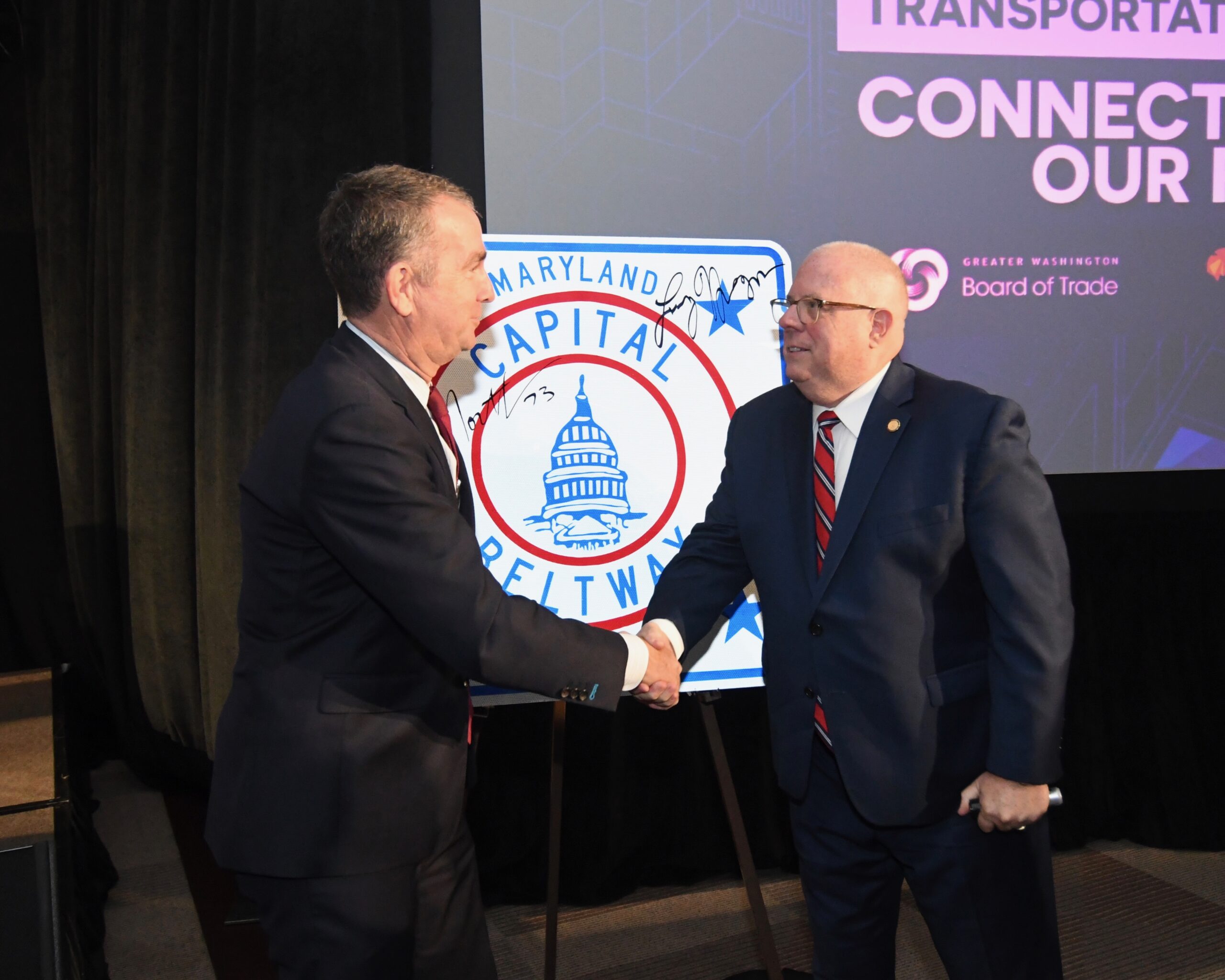Even After 30 Months, MDOT Says ‘Beltway Accord’ Remains a Work in Progress

In late 2019, Maryland Gov. Lawrence J. Hogan Jr. (R) and then-Virginia Gov. Ralph S. Northam (D) announced a $1 billion agreement to rebuild the American Legion Bridge.
Appearing with little notice at a transportation forum in Washington, D.C., the two men signed a placard with the words “Capital Beltway,” as news cameras rolled and photographers captured the moment.
Hogan said the “historic, once-in-a-generation” agreement would speed construction of a new, wider bridge that would help reduce congestion on Interstate 495. The bridge, which carries Beltway traffic between Montgomery County, Md. and Fairfax County, Va., routinely ranks among the worst bottlenecks in the nation.
Nearly 30 months after the governors’ photo-op, the details of the agreement remain a mystery.
Last month, State Highway Administration officials rejected a public records request submitted by Maryland Matters. In a letter, an SHA official referred to the agreement in the past tense. “The Capital Beltway Accord was an agreement between Governor Larry Hogan and Governor Ralph Northam to replace the American Legion Bridge and relieve congestion…,” the official wrote.
The agency said the two states have been working “to develop a formal bi-state agreement on the details of how the replacement of the American Legion Bridge and future maintenance will occur.”
The “draft agreement, drafted term sheet and two bi-state cooperation letters” are considered “deliberative,” the agency added. “MDOT SHA has determined that the disclosure of these records would be contrary to the public interest because, while agreements are under development, disclosure would discourage a free and frank deliberation of alternatives and concerns by those public employees and representatives charged with reviewing and finalizing the agreement without outside influence from other parties.”
In 2017, Hogan unveiled an ambitious plan to add privately-financed toll lanes to the entire Beltway, including the American Legion Bridge, most of Interstate 270 and all of the Baltimore-Washington Parkway. Transurban, a majority partner on the design of Hogan’s project, operates 53 miles of variably-priced lanes in Northern Virginia.
The plan has been scaled back in the face of opposition from Montgomery County elected officials, some residents and environmental activists.
Montgomery County Executive Marc B. Elrich (D) on Tuesday called on the State Highway Administration to release the Hogan-Northam “accord.”
“There’s just no reason for this information not to be made public,” Elrich said. “This has been the subject of much discussion and angst, and for us not to know what the actual deal is, I think is seriously problematic.”
The Virginia Department of Transportation also denied a reporter’s request to see the Capital Beltway Accord. In an email, the agency said it “has no records responsive to your request because the document does not exist as the details are still under negotiation between the two states.”
Hogan has insisted that his proposed “public-private partnership” will result in wider roads at “no net cost” to taxpayers.
After the governors’ joint appearance in 2019, top transportation officials from the two states told reporters that Maryland would pick up 79% of some costs of the $1 billion span and Virginia would pick up the remaining 21%. Other costs would be shared 50%-50%. VDOT’s transportation secretary said the state would add the bridge to its existing contract with Transurban; MDOT chief Pete Rahn said Maryland would use a concessionaire to be chosen later.
In a Maryland Public Television interview last week, Hogan said the project “is moving down the track,” thanks in part to the “accord.”
“It’s not nearly as fast as I would like and we’ve had roadblocks with citizen opposition,” he said. “We reached an historic Beltway Accord with Virginia. We’re going to build the American Legion Bridge. It’s not going to cost the taxpayers money. It’s a tremendous win.”
Former Washington Post reporter and editor Robert McCartney, who covered transportation issues for decades, called it “outrageous” that the accord remains under wraps after nearly 2 1/2 years. “It’s outrageous that they won’t tell us what they’ve agreed or explain why so little has happened since that much-hyped announcement,” he said.
In an interview in March, at the groundbreaking for the widening of the Beltway in McLean, Virginia’s new governor, Glenn Youngkin (R), called the accord “the agreement to work together.”
“The American Legion Bridge is a big chunk of that,” he added. “The relationship with Transurban on their side is a big piece of it.”
On Tuesday, in response to a reporter’s inquiry, a spokesman for the Maryland managed toll lanes project said the Hogan-Northam event was intended to signal the formation of a partnership.
“The Capital Beltway Accord as of November 19, 2019, was not a formal agreement but an announcement of a partnership between Maryland and Virginia at the American Legion Bridge to address regional congestion and an intention to enter into a bi-state agreement regarding the coordination of the interface of the work in Virginia,” he said.
“[T]he agreement is between MDOT and VDOT and is not subject to approval of [the Board of Public Works] or others,” he added. “No drafts will be provided publicly for the reasons stated in your [Public Information Act] response.”
Del. Marc A. Korman (D-Montgomery) said elected officials and residents “have been asking for the Capital Beltway Accord since the governor put his big signature on a press release, and we’re still waiting.”
“I assume they were not deceiving us when they said that they were negotiating something,” he added. “But we’re two-and-a-half years in. I think it’s time to show the taxpayers and the voters your cards.”
Editor’s Note: This story was updated on Wednesday to include VDOT’s response to Maryland Matters’ public information act request.




 Creative Commons Attribution
Creative Commons Attribution